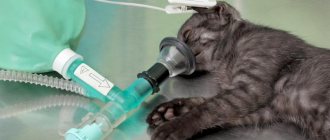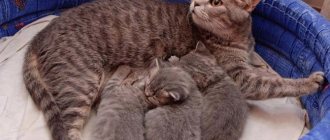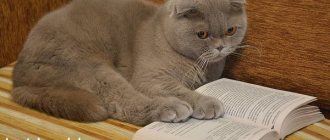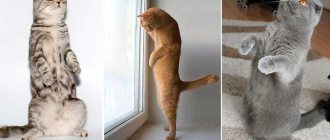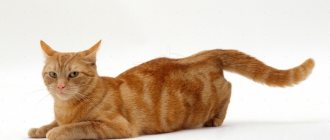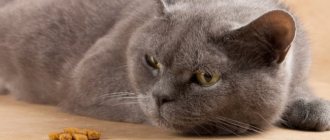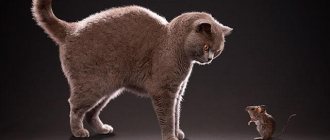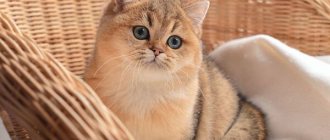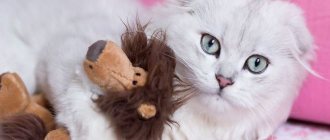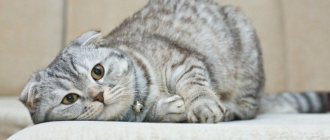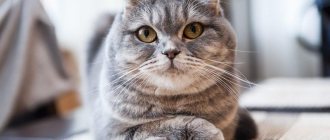The cat eats poorly, but is active: what to do?
There is no need to worry about a short-term change in your pet’s diet, since there are a number of reasons that dictate this eating behavior.
- These furry animals are designed in such a way that if they find an interesting activity that absorbs their entire being, they completely forget about food. Experts suggest that this may be due to the fact that the body turns on the mechanism of getting rid of extra pounds.
- Reducing cat food portions may also be associated with a transition to a different, higher-calorie diet, or food whose taste is unusual for the cat.
- Another reason on this list is stress. Cats are sensitive natures, so excitement, anxiety, sadness and melancholy may well moderate a cat’s appetite, even to the point of actual anorexia.
- Too high an air temperature is one of the most common reasons for refusing to eat. When the temperature is above thirty degrees, even pets with an excellent appetite lose all interest in food. In the heat, the only desire for furry animals is a peaceful sleep in a cool place. Force-feeding cats in such a situation is strictly not recommended. But drinking water will become very appropriate.
- The pet's appetite may decrease if the hygiene of the animal's dining area is in doubt. Being one of the cleanest animals, cats may refuse to eat due to dirty dishes. All bowls should be washed at least once a day.
- A sharp transition from industrial feed to natural food can also manifest itself in limited portions. An animal that is accustomed to feasting on dry food will most likely not be delighted with vegetables with meat, or with cottage cheese. If this is really the only reason, then there is no need to worry - when the cat’s tastes are adjusted, then the appetite will return in full.
- Finally, another reason for loss of interest in food can be hormonal changes - puberty and pregnancy. During cat weddings, animals may not eat food for up to a week - this is especially true for furry brides. The owner need not worry in this case, because the pet’s appetite will return to normal as soon as the hormonal problem is resolved. Veterinarians advise giving vitamins to their pets during this period.
Main reasons
Luckily, many of the main reasons why cats don't eat enough are not serious.
Even though we may think cats are dramatic, they clearly think there are good enough reasons not to eat.
© shutterstock
Food
The obvious reason why your cat may not be eating but is acting normally is most likely due to the type of food she is eating!
As cats age, their senses begin to dull and they may become uninterested in their usual food. This can happen even if your cat has always eaten its own food in the past.
Cats may also simply not want to eat this food for no reason, because that's what cats do! A similar reason is that you may have changed the food your cat is used to. Perhaps you wanted to buy a cheaper or healthier food, or even a new one that was suitable for your stocky cat.
Either way, cats are very finicky creatures, and any change they don't agree with may cause them to simply not eat and wait for you to give them their regular food.
Travel or relocation
Cats like to stay in their territory, so moving to a new place or traveling can have a negative impact on them.
Not only may they hate their new surroundings, but they may also experience motion sickness during a trip or flight, which can cause nausea and loss of appetite.
This cause will likely go away on its own once your cat returns home or gets used to its new home or location.
Stress or psychological problem
Just like people, cats can experience stress and anxiety for a variety of reasons.
Sometimes a change in routine or the addition of a new animal or person can make a cat feel anxious.
Depression is another reason your cat may not eat. Cats that are overly stressed over a period of time become depressed. You may not be around very often, so your cat is bored and sad, which can also cause a lack of appetite.
Cats can also react to the emotional state of their people. If you are nervous and your tone of voice changes, your cat will usually respond to you. They often hide and stay away, but constant exposure to stress can cause overwhelming stress and loss of appetite in your cat.
Recent vaccinations
If your cat's loss of appetite began shortly after your last visit to the vet for vaccinations, these vaccinations are most likely causing the change.
Cats may react negatively to some vaccines, which may cause them to not eat. This problem usually resolves on its own after the side effects go away.
Disease
Disease is something that all cat parents fear when their cat loses its appetite. And, unfortunately, sometimes this is true.
Some conditions, such as infections, intestinal parasites, kidney failure and dangerous cancers, can be the main reasons why your cat stops eating.
© shutterstock
Dental problems
Cats need regular dental care, and it is actually recommended that you brush your cat's teeth at least a couple of times a week to prevent dental diseases such as gingivitis, which is inflammation of the gums around the teeth.
Another serious dental problem is periodontitis, which occurs if your cat's gingivitis is not treated with cleaning.
Gingivitis is moderately painful, and periodontitis can be extremely painful, so if your cat has one of these problems, they will likely not want to eat because it is too painful, especially if their main food source is dry solid food.
Cat doesn't eat well after sterilization
During the first 24 hours, a cat that has undergone a sterilization procedure may show no interest in food at all. However, if apathy towards food continues on the second and especially the third day, you should start to worry and urgently contact a veterinary clinic. Prolonged ignoring of food in this case can signal possible complications after surgery, metabolic disorders, gastrointestinal pathology, and even mental disorders. It is necessary to prevent malnutrition, diagnose the cause of food apathy and begin treatment.
The pet is naughty
If you are confident in the quality of the product you are using, do not rush to change it, even if your cat suddenly begins to eat poorly. Many owners begin to panic: they try options from other manufacturers, then another type, for example, canned food or natural food. Such leapfrog can only do harm and further discourage the animal’s appetite.
Perhaps the cat is simply capricious because you often pamper it with treats (cat treats, food from your table). The cunning animal immediately realizes that it is not necessary to eat boring granules: all you have to do is meow pitifully and the owner will give you a “yummy” treat.
If your cat is not a good eater of dry food, we recommend eliminating all snacks and treats, especially when you are just starting to introduce him to a new type of food. As a last resort, you can skip a couple of feedings: usually after this, even the most capricious ones begin to crunch pellets briskly.
The cat eats poorly and sleeps a lot - lethargic and depressed
Such symptoms, especially when they are observed for several days, are quite alarming - this is a direct reason to contact a specialist and urgently find out the cause of this condition. The earlier the disease is detected, the more successful treatment results can be expected.
A cat's appetite also tends to disappear if the pet has helminthiasis or fleas. Parasites, when multiplying, poison the body, so in this case, prevention, or urgent treatment. The owner must monitor the condition of the premises and also carefully monitor the animal. Symptoms such as vomiting and diarrhea should cause concern.
If there is even a slight suspicion of any disease, you need to urgently contact a specialist! You should always remember that timeliness is the key to successful diagnosis and, as a result, treatment!
The cat doesn't like the food
Sometimes the problem is not the pet, but the dry food itself. A cat doesn't eat well when he doesn't like it. Do not forget that she is a predator, which means that the most desired food for her is meat. It is best to buy dry food, in which meat components occupy the main part of the composition. Acana and Orijen diets contain between 75% and 85% meat, so animals tend to eat them happily.
Please note that cats, unlike dogs, are extremely picky and cautious eaters. Any change in the usual smell of food can cause a decrease in appetite. Remember when you opened the package and how it was stored: perhaps the dry granules have become airy or rancid. In this case, you will have to buy fresh packaging and in the future pay more attention to the proper storage of dry food.
In short, to keep granules fresh you need:
- a dark, cool place, but not too humid;
- an airtight container with a lid made of a chemically inert material (food grade plastic, metal);
- purchase packages that the animal will master in 4–6 weeks.
Pain syndrome and stress
Sudden onset of pain associated with bruises, scratches and damage to internal organs, for example, when fighting with cats during mating festivities. There is aggression towards others, the pet is depressed, reluctant to make contact, and hides in the dark. After identifying the causes of pain, which can be easily determined by an experienced veterinarian, comprehensive treatment is prescribed until the pet recovers completely. Stress motivators indicating the reason why a cat eats little include:
- Change of residence of owners and transportation of the animal
- The appearance of a new pet in the apartment
- Changing the filler in the tray
- Switching to another food
- During the reproductive period
The true reason for the lack of appetite can be determined by a competent veterinary clinic specialist, who will find the root cause of the pet’s reaction and prescribe the appropriate procedures.
Signal of a foreign body entering the digestive tract
Most owners often encounter this problem, which is especially typical for playful cats of long-haired breeds. These could be small fragments of toys, small bones, or simply large accumulations of fur from the animal itself. The main signs for identifying this factor are attacks of vomiting that occur when drinking water and food, abdominal pain and difficulty defecating. With prompt diagnosis and timely removal of the foreign material, the pet will recover completely.
Diseases of the teeth and oral cavity
A cat refuses to eat or eats very little - bad teeth or oral disease can be one of the common reasons for this behavior in animals. In this case, there is a complete or partial refusal to take favorite treats. The most common types of dental and oral diseases that can cause a pet to lose its appetite are:
- Excessive tartar deposits, which damage the gums, buccal mucosa and tongue, causing excessive salivation, chomping and painful sensations when chewing food. Putrid breath is the main sign of the disease;
- Poradontitis is inflammation of the gums and oral mucosa, which may precede the development of fistulas in the nasal cavity and orbit of the eyes;
- A viral infection that affects the oral mucosa, resulting in the formation of small ulcers that make it difficult to eat
Contacting a veterinary clinic will help to timely identify the initial stage of diseases through differential diagnosis and select the correct treatment for a full recovery.
The dangers of not enough food for a kitten
An adult cat is able to survive for a long time without food or get by with a minimum of it. But for a small animal, nutritional deficiency can lead to serious problems. If a kitten does not eat anything or eats very little and poorly, this is fraught with:
- gastrointestinal diseases;
- anemia;
- pathologies of the liver and kidneys;
- breathing disorders;
- heart rhythm disturbances;
- developmental and growth retardation.
Of course, these complications occur when the animal eats poorly and eats little for quite a long time.
It happens that appetite disappears for just a few days, and then returns to normal. But if the kitten is thin and has not been eating well for a week or more, it’s time to sound the alarm.
